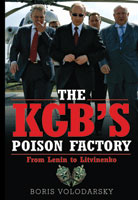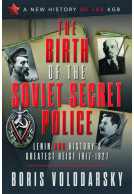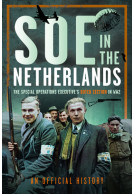The KGB's Poison Factory (Paperback)
From Lenin to Litvinenko
In the news
The Skripals, the Kremlin threat and the Russian security expert who thinks he knows why they were poisoned – The Times' Andrew Billen meets Boris Volodarsky
The dark arts of the Russian poisoners: an interview with former Russian special forces officer Boris Volodarsky, published in The Times (March 2018).
(click here for international delivery rates)
Need a currency converter? Check XE.com for live rates
| Other formats available | Price |
|---|---|
| The KGB's Poison Factory Hardback Add to Basket | £19.99 |
| The KGB's Poison Factory ePub (9.6 MB) Add to Basket | £6.99 |
In late November 2006 the world was shaken by the ruthless assassination in London of Alexander Litvinenko, a former Lieutenant Colonel of the Russian security service (FSB). The murder was the most notorious crime committed by the Russian intelligence services on foreign soil in over three decades.
The author, Boris Volodarsky, who was consulted by the Metropolitan Police during the investigation and remains in close contact with Litvinenko’s widow, is a former Russian military intelligence officer and an international expert in special operations. His narrative reveals that since 1917, beginning with Lenin and his Cheka, the Russian security services have regularly carried out bespoke poisoning operations all over the world to eliminate the enemies of the Kremlin.
The author proves that the Litvinenko’s poisoning is just one episode in the chain of murders that continues until the present day. Some of these assassinations or attempted assassinations are already known; others are revealed here for the first time. Uniquely Volodarsky has had a personal involvement in almost every each of the twenty or so cases covered in detail, from the radioactive thallium poisoning of the Soviet defector Nikolai Khokhlov in Frankfurt in September 1957 to the ricin umbrella murder of the Bulgarian dissident Georgi Markov in London in 1978.
As featured in
The Insider
As featured in: 'Was Roman Abramavich Poisoned?'
The Sunday Times
As featured in
The Times
Referenced in article: 'An Enemy of the Kremlin Dies in London' featured by
The Atlantic, January/February 2017 - words by JEFFREY E. STERN
As featured in
The Times 7/3/18
This book is riveting for anybody interested in delving into the murky world of international espionage.
LSE Connect
This will fascinate students as well as general readers interested in international espionage.
Library Journal
This is an important book that should appeal to a wide readership, not least because of the publicity surrounding the Litvinenko case
Fire Trench website
About Boris Volodarsky
Boris Volodarsky is one of the very few people uniquely qualified to write this book. Boris began investigating the poisoning of Alexander “Sasha” Litvinenko even before the victim passed away in the University College London Hospital. His famous article, “Russian Venom”, was published by The Wall Street Journal on 22 November 2006 correctly describing the then unknown substance that would kill Sasha hours later as a radioactive poison before anyone, even experts from the UK Atomic Weapons Establishment were able to identify it as Polonium-210. Invited to take part in the investigation, Boris collaborated with SO15 and served as a main consultant to the BBC Panorama documentary “How to Poison a Spy” (BBC One, Monday, 22 Jan 2007 at 20:30).
A former military intelligence officer who defended his doctoral thesis in intelligence history at the London School of Economics and Political Science, Dr Volodarsky is a Fellow of the Royal Historical Society and author of several important non-fiction books published in Britain and the USA, including Stalin’s Agent (Oxford University Press, 2014) and his most recent new history KGB: The West Side Story to be published this year by Pen & Sword. Boris currently works an independent intelligence analyst in London and Washington.



















